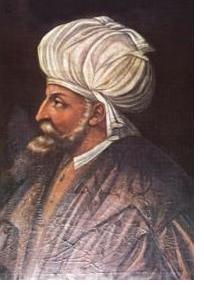Bayezid II the Just (Turkish: Bayezid Adli)
Ottoman sultan 1481 - 1512, b. December 1447 (January 1448?) (Demotica, Ottoman Empire), d. 26 May 1512 (Demotica).
 Bayezid was the son of sultan Mehmed II who had conquered Constantinople (Istanbul). He became governor of Amasya (in today's northern Turkey) at the age of ten. When Mehmed died the Janissaries (the elite Ottoman military corps) prevented Bayezid's younger brother Cem, governor of Konya who had been favoured by his father, from entering Istanbul, and Bayezid was made Sultan in 1481.
Bayezid was the son of sultan Mehmed II who had conquered Constantinople (Istanbul). He became governor of Amasya (in today's northern Turkey) at the age of ten. When Mehmed died the Janissaries (the elite Ottoman military corps) prevented Bayezid's younger brother Cem, governor of Konya who had been favoured by his father, from entering Istanbul, and Bayezid was made Sultan in 1481.
Jem went to Bursa, proclaimed himself Sultan and started to mint coins in his own name. He was defeated by the Janissaries and had to flee and seek refuge with the Christian Knights of Saint John at Rhodes, Greece. Bayezid payed the Knights 45,000 gold pieces a year to hold him captive. Cem's internment was soon transferred to France and then to Rome, where the money was payed to the pope. Cem died in captivity in 1495.
Bayezid's first major concern was the consolidation of the Ottoman Empire. He expanded Ottoman rule into Herzegovina and the lower Danube and Dniester River regions. When Venice entered into an alliance with France the Italian cities Milan, Ferrara, Mantua and Florence approached Bayezid for help; he began a navy building program and took several Venetian possessions in the Peloponnesus and the Adricatic during the 1499 - 1503 war against Venice. He expanded Ottoman rule into Anatolia, where a long drawn-out conflict with the sultanate of Egypt to the south ended without clear result.
Bayezid's next concern was the situation east of Anatolia, where he embarked on a census of the Turkoman nomads for the purpose of taxation. The nomads turned to the Safavids for help, who had established a new regime in Persia based on the Sufi line of Islam. In 1511 a Turkoman uprising against Ottoman rule shook Anatolia.
At this moment Bayezid's sons Selim and Ahmed started to fight over the succession. Selim, governor of Trebizond, sought the assistance of the Tatar khan and marched against his father's troops but was defeated and had to retreat into the Tatar khan's protection. Ahmed, who had helped to put down the uprising in Anatolia, now marched on Constantinople; defeated by Bayezid he established himself as ruler of Anatolia.
Bayezid now came under pressure from his advisers and the Janissaries to solve the succession question. He called Selim back, declared him his successor, abdicated and died within a month.
Bayezid revoked many of the reforms instituted by his father, who had an open mind for achievements of the European civilization. Under Mehmed II works of Italian painters decorated the imperial palace; Muslim religious property of charitable purpose had been confiscated for operation through the state. The Janissaries were opposed to openness to such changes. Bayezid, a pius muslim, had the properties returned to their original institutions. He also had the Italian paintings removed from the palace. The Venetian ambassador to Bayezid's court expressed the displeasure of western Europe when he described Bayezid as "molto melancolico, superstizioso e ostinato" ("very melancholic, superstitious and stubborn").
Among his own people Bayezid was known as "Bayezid the Just" and praised as a ruler. He had the welfare of the population in mind and was modest in his personal expenditure. As a pius Muslim he cared for the ordinary people through an extensive building programme of mosques, medreses, schools, colleges and hospitals and provided a period of great economic development with stability and security. Edirne and Bursa continued to develop rapidly, assuming, with their mosques, caravanserais and other great buildings, the character of imperial cities. The complex of the Bayezid Cami (Mosque of Bayezid) in Edirne was the largest social service building of the 15th century.
Bayezid's was tolerant towards other religions. He exempted the lands belonging to the Koutloumousiou Monastery on Mount Athos (in today's Greece) from the payment of the tithe. But the local moslems were actively hostile towards the monks, exploited the peasants who worked for the monks, cultivated the lands belonging to the Monastery, and demanded continued payment of the tithe. Bayezid ordered the governor (subaci) and the kadi of Thessaloniki to implement the imperial edit granting exemption from the tithe and restore any seized property to the monastery.
Bayezid was also a sponsor of poetry and supported scholars and lawyers in his empire and outside the country as well. He established a school of music, philosophy, theology and astronomy. Among the teachers at the school was the famous music theorist Mehmed Chelebi.
home
 Bayezid was the son of sultan Mehmed II who had conquered Constantinople (Istanbul). He became governor of Amasya (in today's northern Turkey) at the age of ten. When Mehmed died the Janissaries (the elite Ottoman military corps) prevented Bayezid's younger brother Cem, governor of Konya who had been favoured by his father, from entering Istanbul, and Bayezid was made Sultan in 1481.
Bayezid was the son of sultan Mehmed II who had conquered Constantinople (Istanbul). He became governor of Amasya (in today's northern Turkey) at the age of ten. When Mehmed died the Janissaries (the elite Ottoman military corps) prevented Bayezid's younger brother Cem, governor of Konya who had been favoured by his father, from entering Istanbul, and Bayezid was made Sultan in 1481.